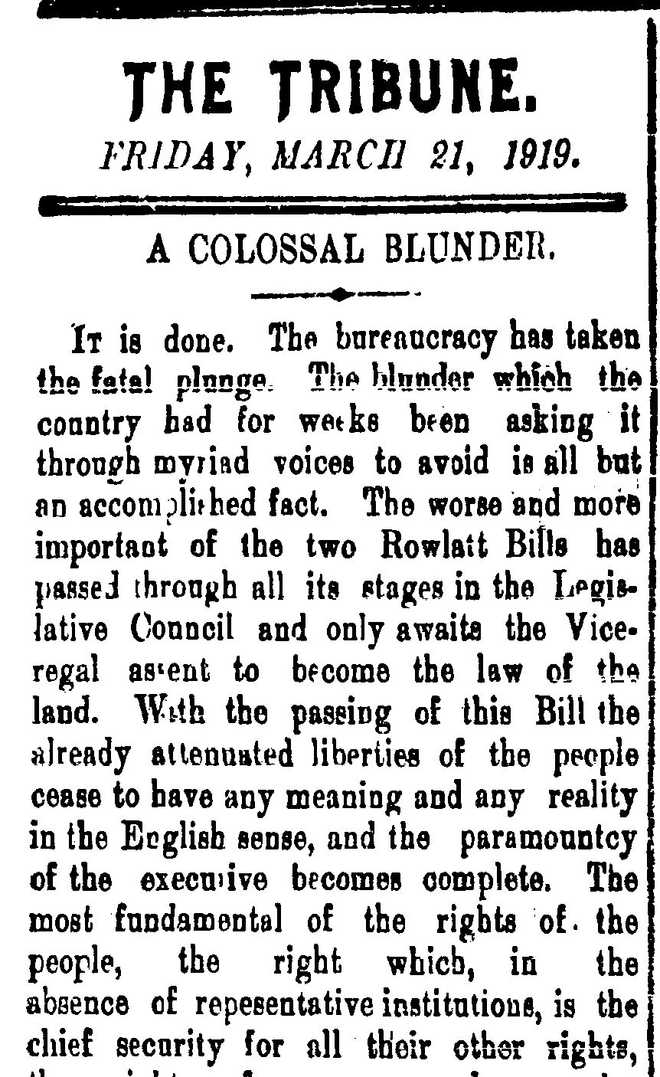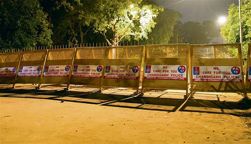
The Tribune editorial: ‘A Colossal Blunder’ (March 21, 1919)
Vikramdeep Johal
Tribune News Service
Chandigarh, April 10
Days before the Jallianwala Bagh bloodbath, The Tribune wrote two hard-hitting, cautionary editorials, titled ‘A Colossal Blunder’ and ‘Blazing Indiscretion’. Both proved amazingly prophetic, foreshadowing the mayhem unleashed by the colonial rulers.
The first editorial (March 21, 1919) questioned the government’s “extraordinarily unwise” action of going ahead with the draconian Rowlatt Bills. “We can only hope it (government) will have the chivalry and the fairness to accept all the responsibility for the consequences that will follow, consequences in the shape of constitutional agitation of unprecedented magnitude and strength both for the reversal of this particular measure and the making of a recurrence of the present disaster impossible in future,” wrote The Tribune, then based in Lahore.
The other editorial (April 10) was a scathing indictment of the ruthless policies of Michael O’Dwyer, then Lieutenant Governor of the Punjab province. Pulling no punches, the newspaper asserted: “But our strongest objection is to the spirit and temper which Sir Michael O’Dwyer brings to the discussion. His Honour knows, as we all do, that the atmosphere is highly surcharged, that the public mind is in a state of unusual excitement. At such a time, a wise ruler would do all he could to allay the public feeling, to utter the soft word that turneth away wrath. The exact reverse of this policy Sir Michael O’Dwyer follows.”
It was such bold writing, unjustly dubbed seditious by the repressive powers-that-be, that led to the arrest and incarceration of the Editor, Kalinath Ray; the newspaper was fined and its publication suspended.
Ray was accused of having “published false reports which he had no reasonable ground to believe to be true and which were likely to cause fear and alarm to the public, and promote feelings of enmity and hatred among His Majesty’s subjects”.
Pleading “not guilty”, he found a vociferous defender in Mahatma Gandhi, who observed, “In every case… the writer has fortified himself with what he believed to be facts, and which, so far as the judgment allows us to see, have not been controverted.” Four months after his arrest, Ray walked out of jail on August 27, 1919 — as defiant and uncompromising as ever.
On April 6, 1919, the day of a nationwide protest called by Gandhi, The Tribune made an earnest appeal to its readers, stressing on maintaining dignity and self-restraint: “We are out not for creating trouble but for preventing it, not for acting lawlessly, but for making a strong and decisive protest against the passing of a lawless law, not for violating our brothers’ rights, but for preventing a violation of our own rights and theirs… Our only weapons are the weapons of knowledge, of self-suffering and sacrifice. Our only appeal is to the force of public opinion, the mightiest of all forces. That is what the great leader of the movement has impressively taught us...” The newspaper thus rose to the occasion during turbulent times without compromising objectivity and left its indelible imprint on the freedom struggle.
These editorials and other writings are part of The Tribune’s upcoming book, ‘Martyrdom to Freedom: 100 Years of Jallianwala Bagh’, to be released on the centenary of the momentous tragedy.
5 crucial questions posed by the Tribune in 1919
In its edition dated December 7, 1919, The Tribune asked five key questions based on Brigadier General Reginald Dyer’s deposition before the Hunter Committee:
- Was the General justified in taking no step between 12:30 pm, when he first heard that a meeting was going to take place, and 4:30 pm, when the meeting did take place, to prevent the crowd from assembling?
- Was he justified in opening fire without warning and without giving an opportunity to the gathering to disperse?
- Was he justified in not stopping the firing when he found that with the very opening of fire the crowd had begun to disperse?
- Was it necessary for him to continue, and was he justified in continuing to fire until ammunition had run short and about 500 men had been killed and at least thrice as many men had been wounded?
- Was he justified in leaving the wounded to their fate, and taking no step to render first aid to them?
The newspaper made it clear that “to all properly constituted minds, these questions admit of but one answer” — an unequivocal ‘no’ — and went on to demonstrate how unconvincing were the General’s answers. A century later, Britain continues to maintain silence on The Tribune’s probing posers.





















